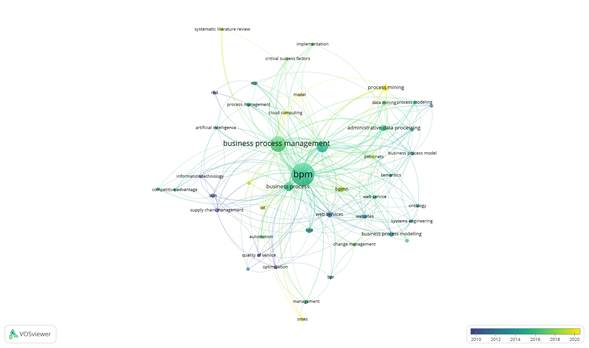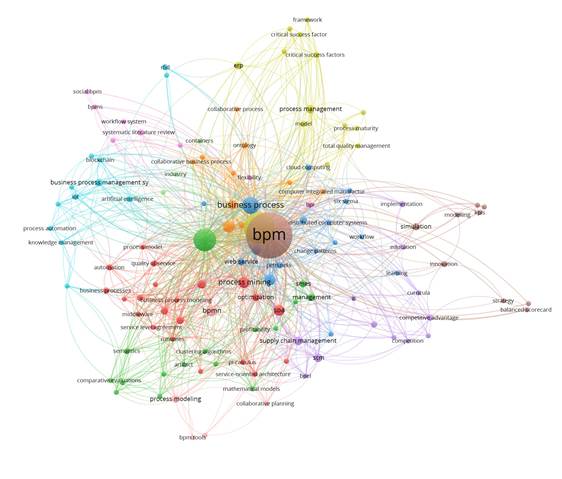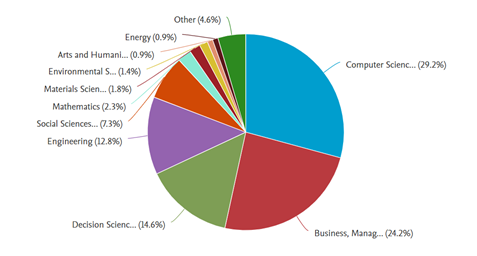I. INTRODUCTION
In the 21st century, organizations must constantly adapt to global technological and marketplace changes, requiring effective management practices to maintain competitiveness and agility. Business Process Management (BPM) has emerged as a philosophy focused on optimizing business processes to meet these needs. The methodology involves identifying, designing, implementing, and continuously monitoring these processes to improve them. Globally, BPM has been widely adopted in the public and private sectors to increase productivity in organizations, contributing to success and competitiveness ;[1];[3]. This article explores in detail the evolution and relevance of BPM in the current business context, highlighting its benefits and its role in pursuing business excellence, specifically in the approach to construction projects.
Currently, the construction sector is one of the drivers of the world economy, primarily through factors such as the demand for inputs and construction materials, which are reflected in the infrastructure works of the different sectors of the economy. In Colombia, this sector represents one of the major sources of development and one of the most robust economic activities. Therefore, the processes carried out for the proper planning, execution, and completion of projects require qualified, competent, and updated management personnel.
BPM is a systematic approach used to identify, raise, document, design, execute, measure, and control both manual and automated processes in a company in order to achieve the objectives with the unique results of each process that is aligned with the organization [4]. The BPM methodology is supported by technological tools that facilitate the improvement, ease, and management in the interpretation of the processes from start to finish, generating a route to achieve the results of the company or construction site, enabling the achievement of the objectives in terms of time, resources, and scope with greater agility ;[2];[7].
Construction project management is an area that requires particular strengthening, as it is where most deficiencies are identified. In the country, this process is still carried out simultaneously with construction, and only a few activities are planned [13]. Most of the tasks are executed as the construction process progresses, which may lead to some improvisation in the execution of the projects [14].
In this context, Galvis et al. (2014) suggest that integrating information and communication technologies can play a crucial role. These tools can be used to change the way process management in construction is approached. Instead of being treated as isolated functional areas, they can be conceived as a synergistic and integrated system, facilitating considerable benefits in terms of efficiency and quality in project execution [5].
II. METHODOLOGY
Presents a review of current information as a methodological strategy for an analysis of the conditions of BMP (Business Process Management) disciplines, comprising documentary research, defining the background to determine the intentions of the BPM methodology and take it to new research generating contexts, cementing an approach and trend to the implementation of strategies in construction projects. For the current status, different databases offered by the Universidad Pedagógica y Tecnológica de Colombia were consulted, including Access Engineering, Art & Architecture Source, Business Source Ultimate, Catalogo Bibliográfico UPTC, Computers & Applied Sciences Complete, Dialnet, Ebsco, Oxford, Sage Journals, Scielo, ScienceDirect, Scorpus. The indexed journals associated with several universities in the country were also included in the search. The different software suppliers that include the BPM methodology were reviewed with their respective manuals and tutorials for the implementation of each one of them [6];[12]. The table shows the number of journal articles found per database consulted.
The search criteria were determined based on the keywords "BPM (Business Process Management)," "business process management," "application of BPM in companies," and "process management in construction." The document search included a total of 5,191 sources. This review highlighted the trends that have influenced business process management (BPM) research and identified areas where gaps have been found with a focus on construction.
III. RESULTS
In the bibliographic analysis, several databases and indexed journals related to the BPM methodology and its application in construction were consulted. A total of 5,191 articles addressing this topic were identified, evidencing the interest and relevance of this methodology in the construction field and the development of applications. This study lays the foundation for a greater understanding and adoption of BPM in the construction sector, with the potential to transform and optimize project management in this crucial industry.
The importance of construction process management is evident in the literature; different methodologies have been implemented, and different approaches to optimize construction processes have been studied. Figure 1 shows the relationship of the search criterion: "BPM (Business Process Management)", which obtained the most results compared to the other three search criteria. The integration with other patterns was found in Figure 1, highlighting different keyword references such as enterprise resource management, administrative data processing, and business process modeling, among others, which supports the argument for the implementation of the BPM methodology in the construction processes.
When analyzing the historical results, we found new trends and approaches related and integrated to the research and use of the BPM methodology. Figure 2 shows that the yellow color marks the new horizons of knowledge. In this case, process mining has marked a new direction for research. It is important to recognize the breadth the methodology can have in the areas involving processes.

Fig 2 Cooccurrence descriptors of the search pattern according to year of publication BPM (Business Process Management).
By integrating BPM Methodology tools focused on project management in the construction sector, a new era of control and efficiency in operational processes is inaugurated. This convergence provides a global and cohesive vision of the company, allowing a comprehensive evaluation of the effectiveness of each function and process. This perspective becomes an essential pillar for companies in the industry, providing them with agility and adaptability while preventing unnecessary disbursements and delays in project execution [9].
The areas of knowledge in which the BPM methodology has impacted are reflected in the number of articles found on each topic, as shown in Figure 3. These different thematic streams indicate the scope and applicability of the BPM methodology in various fields of knowledge. The four main ones are listed below:
- Computing (29.2%): In this field, the BPM methodology has been applied to improve the efficiency and management of processes within computer systems and applications. It seeks to optimize workflows and automate tasks to achieve better performance in digital environments.
- Management and business (24.2%): In this area, BPM is used to model, analyze, and improve business processes in organizations. This involves identifying areas for improvement, optimizing workflows, and implementing practices that lead to more effective and efficient management.
- Scientific decisions (14.6%): GMP has also been applied in making decisions based on scientific data and evidence. This can include process optimization in laboratories, analysis of experimental data, and research projects.
- Engineering (12.8%): In the field of engineering, BPM focuses on the optimization of design, production, and project management processes. It seeks to improve efficiency in the execution of tasks and the coordination of multidisciplinary teams.
The focus areas show how the BPM methodology has found significant applications in a variety of disciplines, demonstrating its versatility and its potential to improve efficiency and effectiveness in a wide range of professional and scientific contexts. The feasibility of implementing the case study in the different construction processes of civil works is evidenced for the case study. Figure 3 below shows the different thematic approaches to the "BPM (Business Process Management)" search criteria.
This strategic implementation translates into tangible improvements in operations, promoting cost reduction, balanced workload allocation, and the minimization of non-value-added activities. Not only does the company enjoy a palpable benefit from this decision, but its customers also appreciate the difference. This manifests in fewer delays, greater alignment with the original plan, greater transparency in the development of activities throughout each project, and a reduction in associated costs. In summary, a specialized BPM Methodology tool for project management in construction becomes a differentiating element and a generator of competitive advantage for companies in a sector where standing out from other market players is crucial.
As well as implementing the Work Breakdown Structure (WBS) of the PMBOK in construction [8];[15], the BPM methodology for construction presents an efficient and strategic operation. This is achieved by defining workflows, specifying the roles involved, and, in relevant cases, opting for automatic processes. This integration makes it possible to capture the critical processes established by the company accurately. In addition, this methodology makes it easier to obtain detailed information on times, from the beginning to the completion of each task.
Adopting a BPM for construction represents a significant advance, marking the abandonment of traditional management methods based on paper processes and verbal communications and giving way to the use of project management software [16]. By integrating BPM work processes, assignment of responsible parties, and execution deadlines, companies can identify potential bottlenecks that could impact their operations. Likewise, corrective actions can be implemented promptly, which translates into tangible improvements in the organization's performance. This provides greater agility and adaptability, allowing the company to remain aligned with market demands at all times.
The implementation of the BPM Methodology in the construction sector brings a substantial competitive advantage to companies in several aspects. First, it provides a clear and transparent definition of the company's business processes, which is essential for a smooth and efficient operation. In addition, it improves productivity by alerting users to the tasks they need to perform, avoiding the need to search for them manually. It also avoids duplication of tasks by identifying them precisely, reducing the possibility of them being performed by different people. This, in turn, leads to improved customer service, both internal and external, by speeding up the execution of processes. It also contributes to cost control by implementing an authorization system for those responsible for incurring specific expenses.
The combination of the BPM Methodology with construction provides a design, measurement, and control of business processes in all areas, from the commercial phase to after-sales service. This represents a valuable opportunity to move towards a leaner, more efficient, and agile management, with a greater potential to generate value in the construction industry [10].
The implementation of the BPM Methodology in the construction environment brings with it the need to address the risks inherent in this approach. It is crucial to recognize that adopting technologies such as Building Information Modeling (BIM) introduces substantial changes in the levels of risk associated with projects. While these technological innovations offer numerous benefits, they also pose new challenges and opportunities for both specific projects and the firm as a whole.
Effective management of these risks is critical to successfully implementing BPM in construction. Therefore, it is essential to consider tools that facilitate the automation of organizational processes [9]. These systems are designed to improve the organization of information flows, efficiently control time, and reduce the possibility of errors in documentation. Adopting these solutions ensures that processes are aligned with the BPMS (Business Process Management Suite) model, avoiding reprocesses and optimizing efficiency in project execution.
This effective integration of BPM and technologies such as BIM represents a significant advance in construction project management, enabling companies to achieve higher levels of productivity and efficiency in a highly competitive environment [11].
The Business Process Management (BPM) methodology emerges as a management philosophy that focuses on optimizing the business processes of an organization, seeking to generate greater efficiency and effectiveness. In the context of application development in the construction sector, this research focuses on exploring the current state of this methodology, specifically in the requirements subprocess. It is based on identifying functional requirements and adding value through improvements in planning and process optimization. Implementing this methodology leads to an increase in control activities, thus reducing the risk of errors in the capture of requirements and optimizing the time involved while encouraging a more active participation of all stakeholders in the process.
Construction, a fundamental pillar in the global economy, demands an efficient and updated management of its projects to ensure sustainable and competitive development. In Colombia, this sector represents one of the main sources of economic growth, which underlines the importance of having highly trained and competent personnel [17]. Adopting BPM as a systematic approach facilitates the identification, documentation, and improvement of manual and automated processes in a construction company. This leads to obtaining results aligned with the objectives of the organization, promoting efficiency in achieving goals in terms of time, resources, and scope.
One of the critical areas to be strengthened is construction project management, where deficiencies are frequently found. In Colombia, this management is often carried out parallel to the construction itself, which can lead to improvisations in project execution. By leveraging information and communication technologies, companies can transform their approach to a more synergistic and integrated process management, thus maximizing the benefits of a cohesive operation.
IV. DISCUSSION
The article provides a detailed and enlightening view on applying the Business Process Management (BPM) methodology in the construction sector. It highlights the importance of BPM as a management philosophy that seeks to optimize business processes, which is essential in a sector as dynamic and critical as construction.
The implementation of BPM in the requirements sub-process for developing applications in construction shows significant results. By integrating functional requirements and focusing on continuous improvement, greater efficiency and effectiveness in project planning and execution are achieved.
The research highlights the fundamental role of BPM in controlling activities and reducing risks associated with errors in decision-making. In addition, involving all stakeholders more actively fosters effective collaboration and a complete understanding of project objectives.
Regarding the methodology used in the study, the documentary review and background analysis provide a solid basis for understanding the current state of BPM in the construction context. The selection of international and national sources and the inclusion of several databases enriches the perspective and reliability of the results.
The focus on construction project management is particularly relevant, as this is a critical point where challenges and shortcomings may arise. Incorporating information and communication technologies with the BPM methodology offers a synergistic system that optimizes processes and promotes management efficiency.
Implementing the BPM Methodology in the construction sector represents a significant opportunity to optimize and transform project management in this vital industry. By focusing on identifying functional requirements and adding value through improved planning and process optimization, BPM offers an effective way to increase efficiency and effectiveness in the development of construction applications. This benefits companies and contributes to the growth and sustainable development of the global construction sector.
In summary, this article highlights the relevance and benefits of the BPM methodology in the construction industry. It provides a valuable perspective on how BPM can be a crucial tool to improve the planning, execution, and completion of construction projects, thus contributing to the growth and development of this industry.

















